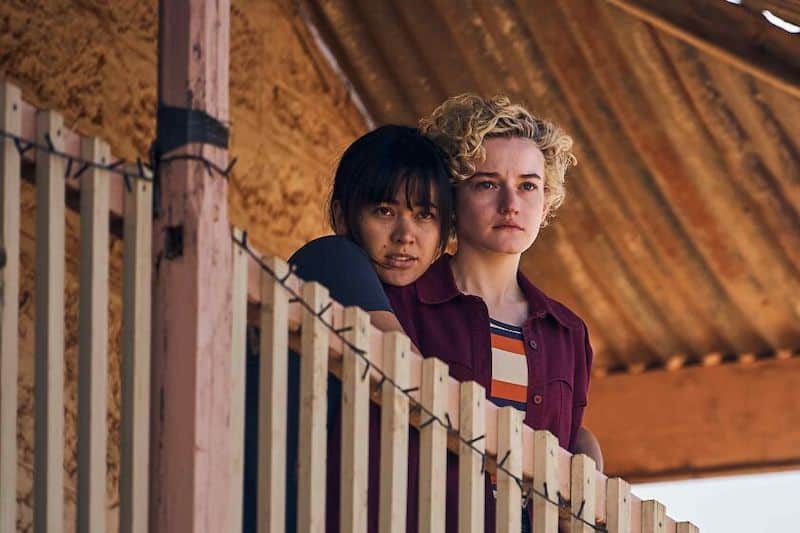As part of our coverage of the 42nd Vancouver International Film Festival, Meg Shields reviews Kitty Green’s follow-up to ‘The Assistant,’ the Australian Outback-set thriller ‘The Royal Hotel.’ Follow along with more coverage in our Vancouver International Film Festival archives.
Hanna (Julia Garner) and Liv (Jessica Henwick) have run out of money. But they have a plan. To keep their Australian backpacking trip rolling, the duo sign up for a work-travel program that lands them in a remote mining town in the Australian outback. Their new place of work? The Royal Hotel: a puke-stained watering hole for the community’s disgruntled, beer-guzzling locals. Thrust into the armpit of rural White Australia — and all the machismo and sexism that entails — the young women find themselves in an increasingly dangerous situation.
The Royal Hotel marks the sophomore narrative feature from Australian director Kitty Green, who cites Pete Gleeson’s brilliant 2016 documentary Hotel Coolgardie as a key inspiration for framing the rowdy, predatory Outback through a foreign female lens. The idea being: what would happen if two assertive American tourists were confronted with normalized Outback chauvinism? Calm, civil debate, surely.
Despite its noble pretenses, The Royal Hotel can’t help but reek of “we have Wake in Fright at home.” And while gesturing towards other films isn’t bad, per se, the last thing you want is for your audience to be sitting there wishing they were watching that other, better movie you keep referencing.
Because if you’re going to enter a cage match with Ted Kotcheff’s palpably evil Australian New Wave masterpiece, you better be ready to crank the weirdness dial up to eleven. And, unfortunately, whereas Wake in Fright embraces hyperreality to bring an unhinged purgatorial element into the mix, The Royal Hotel plays its hand with a straight face.
This is par for the course for Green, whose controlled approach to real-life gender politics worked wonders in the muted environment of The Assistant. But here, Green’s restraint frequently clashes with the film’s ostensible desire to be a terror trip. I wouldn’t be making such a big deal about any of this if The Royal Hotel didn’t contain such clear, exaggerated visual flourishes that belie Green’s intent to flirt with the horror space: ghoulish closeups, peephole framing, and no short supply of grit, grime, and gunk. And, all told: Green’s good-faith commitment to marrying realistic gender politics with the revenge-thriller genre never comes together in a cohesive way. Consequently, rather than feeling nightmarish, Hanna and Liv’s predicament feels more mundanely infuriating than genuinely perilous.
You get the impression that Green really wants you to be aghast at how misogynistic and dehumanizing it would be to be a young woman bartending in the Outback. But is it really that groundbreaking to point out that townies are sexist boozehounds? Or that being a feminine person in the service industry can sometimes make you vulnerable to unwanted sexual advances? Who is supposed to be shocked or shaken by this, I wonder?
The one oasis of wackiness is Hugo Weaving, who heroically inserts some compelling chaos into the mix. Weaving offers what is easily the most heightened performance in the film; a debauched keg-licker who’d sooner turn his liver into a raisin than confront what’s become of his life. He is carried off-screen in a makeshift stretcher, taking the film’s last hope of any true sadistic strangeness with him.
When the film finally reaches its inevitable “let’s blow this popsicle stand” conclusion, any catharsis we should be feeling has long since fizzled out, leaving Hanna and Liv’s ostensibly triumphant departure feeling less like satisfying revenge and more like an unearned overreaction. This film literally concludes with our heroines burning a patriarchal institution to the ground. You know … in case there was any chance we missed the point. It’s the kind of unsubtle bombast we’d expect from a more genre-affiliated thriller. But abutted by Green’s naturalistic character drama, it feels like the ending of a different film.
What we have on our hands is a technically competent film that fails to stick the landing tonally and thematically. I would encourage both genre fans and Ozploitation aficionados to temper their expectations. There are minor thrills to be had. But on the whole, Green’s fourth feature is too scattershot to pack a real meaningful punch.
As of the publishing of this review, North American distribution has been secured but no release date has been set.

